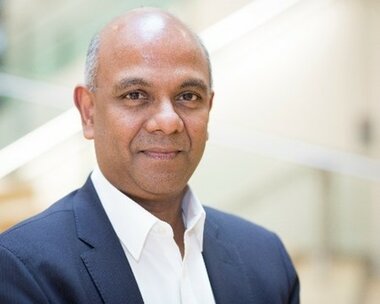1 February 2023
The Joint-Lead of KHP’s Cancer CAG [pictured] outlines his pathway to a career in breast cancer surgery and research, and tell us what motivates him to deliver innovative patient care.
What’s your role at King’s Health Partners?
Along with my colleague Professor Sean Whittaker, we jointly lead the Cancer Clinical Academic Group and King’s Health Partners Comprehensive Cancer Centre. In my role as a clinical academic, I hold the Chair in Breast Cancer at King’s College London and I am an honorary surgical consultant at Guy’s and St Thomas NHS Foundation Trust.
What inspired you to get into this work?
I graduated in Madras Medical College in India prior to moving to the UK where I initially embarked on training to be a cardio-thoracic surgeon at Harefield hospital. After a stint in Birmingham and a more prolonged phase of surgical training in Glasgow, I decided to move into breast cancer surgery and research since I was inspired by the work of my mentor Professor David George, the then Regius Professor of Surgery.
I enjoyed the clinical and academic interface in breast cancer which at that time was at the forefront of solid tumour research. The bench to bedside approach resulted in major discoveries that had a direct impact on clinical care.
What do you enjoy most about your work?
The ability to deliver high-quality clinical care combined with a constant desire to seek better ways of diagnosing and treating patients through novel research in biomedical imaging and discovery in the laboratory is extremely fulfilling. I have a deep interest in global health and enjoy delivering programmes of research across areas of cancer care in India which include prevention, early detection, accessibility, and affordability of cancer care. Working in high-performing teams is something I have experienced throughout my career, and this is a powerful enabler in delivering high quality patient-centred care.
What are the benefits of working in partnership?
The ability to harness the collective knowledge, wisdom and experience of colleagues across multiple disciplines, the sum of which results in outcomes that are greater than that of individual parts, thereby benefitting patients with cancer. The camaraderie and friendships that develop as a consequence of this can be meaningful and long-lasting. Furthermore, working in such a conducive environment can inspire the next generation of clinicians and researchers.
What would be your career top tip?
Always place patients at the heart of everything you do professionally, and you will find that you can achieve more than you can possibly imagine.





